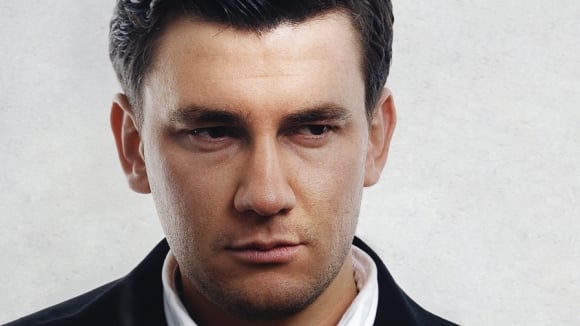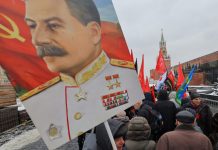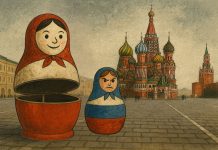
Rustem Adagamov tweeted this post by Dmitry Glukhovsky earlier today and it’s worth taking note of.
Глуховский о том, как путинская пропаганда смогла оболванить русских быстрее, чем Геббельс оболванил немцев https://t.co/UpIySrQFjf
— Рустем Адагамов (@adagamov) 27 августа 2015
I remember two years ago, I loved to speculate: how, I wondered, the German people, who are not only proud of, but boast a complex culture, refined and Western literature, advanced philosophy, humanistic traditions – a great, without flattery, civilization – could in just two decades completely lose control and turn first into a crowd, and then into a flock, to unlearn thinking – willingly, with a passion to unlearn – to believe an antisocial ogre, to make him into their national leader, and to take systematically, and with the German love of order to destroy the blood of other living people?
I was interested not in Hitler, but in ordinary Germans: why good citizens were willing to lose their humanity, why they need to take their neighbors into concentration camps, and why it was so easy to carry their children in empty prams sent from Birkenau.
I tried, but could not figure out what components of the human soul here in answer. My own country also went through totalitarianism, through repression; but in Stalin’s Union, it seems to me, that some other mechanism functioned: there, at the expense of mass and unpredictable repression animal terror was instilled in people, they completely lost the ability to think straight and resist, and humbly waited for whom Moloch [the Canaanite idol to whom children were sacrificed in the Old Testament] would devour next.
And a year ago, it was shown to me how it is. How people who for 20 years, like, live freely, which allows them (for the first time in our thousand-year history) to think freely, and the ability to choose their own faith and ideology, can in a few months slip back not only to the days of the Soviet dictatorship — but further, deeper — into some kind of Middle Ages.
It turns out that all that was needed was the TV to turn the media into a propaganda tool. This was done: simultaneously roughly, primitively, and masterfully. Joseph Goebbels could only have dreamed of such a tool as the modern Russian TV. So what for Goebbels took a decade, we cranked out in a year. The people were ready for this. Ready to believe that we are surrounded by enemies. That they want to break us up into pieces to occupy, colonize, suck our precious oil and our favorite gas. To gobble us up and digest. To finish us, and to raise the Stars and Stripes over the Kremlin.
Why do we believe them, why buy into a sometimes obvious lie? After all, we did not really lose the Cold War. After all, we are not obliged to pay billions in reparations, the US Marines have not been marching triumphantly through Red Square, and nobody has taken Kaliningrad from us. Where did this sense of national humiliation, defeat that is inflated on TV come from?
Of course, it is an empire that is falling apart and has been sinking for 300 years. None of the people who bid farewell to empire find it easy — even the Hungarians still cannot give it up. And yes, it became clear that the whole system of values in which we grew up, the ideology suddenly appeared wrong. But the main thing — the people in the new Russia had no sense of chosenness, uniqueness, majesty, there was no sense of belonging to a power, which is respected and feared throughout the world and that this world is changing.
The Russian has never truly been free: in his personal life, perhaps, and then not always. And he has never been full. And the state has never allowed him to feel self-respect. In all eras, respect is replaced by pride in his country. Based, of course, on propaganda.
And in the past few years, the country has been given no new reasons to be proud, only disdain and doubts. That is why the State celebrates Victory Day (May 9) every year with just pomp and ceremony. There is no more important in the history of modern Russia than the Soviet victory over Nazi Germany. The myth of the struggle against fascism and the victory over it was the main ideological myth of modern Russia, the main rallying point for the motley, multi-ethnic population of our country.
That’s the whole psychoanalysis.
But is this enough to make 9 out of 10 of my fellow citizens suddenly believe that a million people on Maidan [in Kyiv] — the same people, like every Russian viewer — received a salary from the US State Department. Believe. And believe that in Kiev have come to power real fascists, a cheap popular image from an old movie about the war. Believe in the roughly daubed hysterical propaganda plot structure about the crucifixion of small children by Ukrainian Fascists in Eastern Ukraine.
Believe that Crimea, if it had not joined the Anschluss, the Americans would have taken it away and placed their 6th fleet in Holy Sevastopol. Even my educated friend believe it! I tell them, nobody wants Sevastopol! Turkey, whose army is not inferior to the Russian army, has been a member of NATO for half a century, and completely controls and Bosporus and Dardanelles. Nobody needed Crimea, but Putin – to prevent Ukraine from joining NATO! They do not hear, they do not understand, they do not believe. They do not even want to think that this Russia invaded the Donbass. To say it out loud is to be called a traitor. No, it is Ukrainian fascists on a punitive operation against the Donbass militias. They needed a mythology about the Great Patriotic War….
And it is not getting better: now Nemtsov is murdered, and apparently, the TV, out of respect for the deceased cooled down a bit, and did not mock his corpse; but read the internet — and there, wound up, disturbed, stranded propagandised citizens, shouting, “for a dog — a dog’s death!”
And the probably ten percent, who from the beginning have seen in all the Crimean and Donbass campaigns the lies about the continuation of the Great Patriotic war, the inflating of anti-Western hysteria, — the pragmatic calculation, the cold-blooded manipulation of a stupefied population — now they are afraid. They say they are not afraid, and join tens of thousands marching in central Moscow — but they are afraid, of course.
If they managed to murder Nemtsov — then, probably, they can kill anybody. Whoever it was. And now — after Crimea, after Donbass, after Nemtsov — anything can happen. And the camps, and repression, and the strollers of Birkenau. Somehow it turns out that people quietly go along with it. And it is not only the Germans who are capable of it, we are as well, apparently. I do not want to believe it. I would like to reassure myself: this is panic, this is paranoia. But Germany, I think, had its own 10 percent who did not vote, did not march, did not yell — and they all too did not want to believe it was possible.
It appeared possible. And now, it seems, everything is possible.
By Dmitry Glukhovsky, Ninajobe




